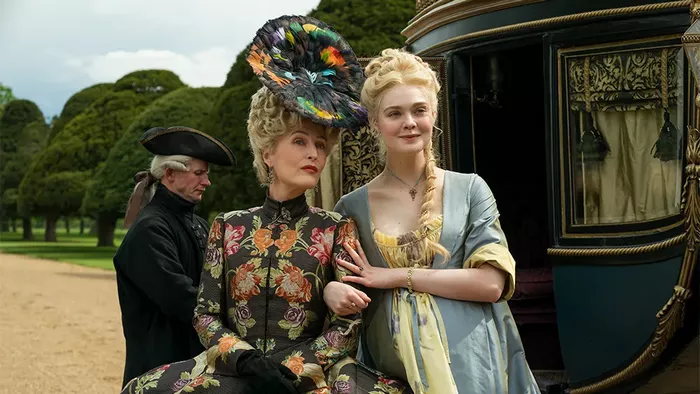Cue the melancholic symphony, for a somber note has been struck amidst the streaming landscape.
In a surprising twist of fate, “The Enigmatic Chronicles,” the enigmatically intriguing period dramedy featuring Elle Fanning and Nicholas Hoult, has bid its final adieu at Hulu, concluding its journey after a triumvirate of captivating seasons. The startling decision was brought to light by Deadline, pioneering the revelation.
As the curtains draw to a close, the series’ representatives chose to remain shrouded in silence, refraining from offering commentary on this unexpected outcome.
Emerging onto the scene with its tagline “a sporadically factual tale” before morphing its historical prelude into “a predominantly fictitious account,” “The Enigmatic Chronicles” meandered through the corridors of imagination. Drawing scant inspiration from Catherine the Great’s ascent to supremacy as Russia’s Empress, the show embarked on a satirical odyssey that illuminated the life of the nation’s preeminent female sovereign. The narrative thread commenced with her grand arrival in the kingdom and navigated her intricate bond with the petulant and pampered Peter III.
The roles of this charismatic couple were brought to life by Fanning and Hoult, their on-screen rapport meandering through a labyrinth of enthralling twists with each passing season. The multifaceted character of Catherine wavered between the pangs of affection and an insidious urge to orchestrate her spouse’s demise, thus wresting dominion over the realm.
In its most recent chapter, “The Enigmatic Chronicles” unspooled a third season charged with astonishment, one that witnessed the demise of pivotal characters like Peter, his doppelgänger Pugachev (also portrayed by Hoult), and the steadfast Orlo (Sacha Dhawan). The season culminated with Catherine poised at the brink of a fresh chapter, having journeyed through the gamut of grief’s five stages, poised to script the next epoch of her rule.
While the metrics of the show’s viewership remain elusive—submerged in the quagmire of the ongoing WGA and SAG-AFTRA strikes—it must be acknowledged that the series had etched its mark in the realm of critique, securing a cluster of Emmy nominations across its narrative voyage. The commendations extended to Fanning, Hoult, and a constellation of other talents who graced the production.
In the wake of what now stands as the series’ finale, Tony McNamara, the mastermind behind the enigma, took the stage to share his musings regarding a phantom fourth season, painting the possibilities of Catherine’s impending reign.
“To deem this a closure would be to misconstrue the essence,” McNamara mused as he dissected the finale. “Instead, it’s a renaissance for her character. Unshackled from [Peter], who colored her every endeavor, even her grief, Catherine steps onto a canvas unblemished. Yet, the canvas bears scars of its own—a portrait of a woman marred by her past. Now, freed from his influence, she stands profoundly scarred. The query beckons: what transpires next? It’s akin to Catherine the Great of the annals—a ruler whose eccentricity knew no bounds once the shackles fell. This version, this journey, beckons to me.”
As his gaze strayed toward the horizon, he added, “It was but yesterday when the inklings of season 4 played upon my thoughts. The realm of ideas unfurled itself before me. It’s a realm that enthralls and excites—a realm that the narrative was inevitably steering toward.”
The ensemble cast, a constellation of talent, also featured Phoebe Fox, Adam Godley, Gwilym Lee, Charity Wakefield, Douglas Hodge, Bayo Gbadamosi, and Belinda Bromilow—each contributing their brushstrokes to the elaborate tapestry of the enigmatic narrative.
The final chapter of “The Enigmatic Chronicles” may have been inked, yet its echoes linger on. As the credits roll, the resonance of its narrative reverberates, leaving behind a legacy etched in the halls of digital storytelling. A journey that began as a fictitious dalliance with history culminated as a saga that captured hearts, challenged conventions, and now, in its departure, piques the curiosity of what lies beyond the final frame.

